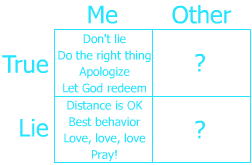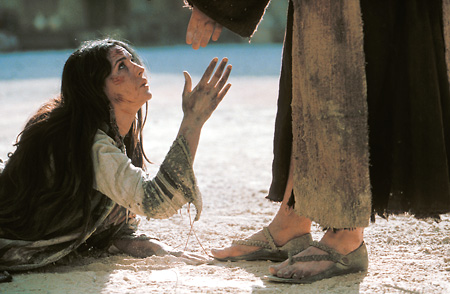Biblical Models for Handling Controversy
Posts tagged with "Controversy"
Lifting others out of scandal
My last two posts have been part of a series on Biblical Models for Handling Controversy. I broke it down into four categories in a sort of "Punnett Square" style. A controversy can either be about you, or someone else. The one accused can be accused legitimately or falsely (see diagram). Then I examined the first two cases by providing Biblical ideas, reinforced with quotations from Mary Baker Eddy.

If you were looking forward to reading four posts in this series, I apologize, as this is the final post. That's because when someone else is at the heart of a scandal, the Biblical advice is the same whether they're guilty or not! More on that in a moment.
The first lesson on what to do when controversy has arisen which you are a witness to, but not the cause of, is to slow down and withhold judgment. Don't lash out with knee-jerk reactionary comments; first make sure you've got all the facts. And always consider that you could be the one who's mistaken. This is said succinctly by the writer of Proverbs: "Fools vent their anger, but the wise quietly hold it back."
Suppose you have been patient, careful, and the evidence clearly shows the offending party was wrong. Then what? Now you get to condemn them, right? No. Even if someone is legitimately in the wrong, the Bible recommends to try and redeem the situation rather than condemning it. Here's a story to illustrate.
Once upon a time, a woman cheated on her husband, was caught while doing it, and was dragged out into the town square in front of a man named Jesus. The men who dragged her out there had their own ulterior motives for doing so -- they wanted to show everyone that Jesus wasn't as good of a church leader as they were -- so they angrily asked what should be done with the woman. Keep in mind, at the time adultery meant you could be stoned to death.
Jesus' first response was to not respond at all. He ignored the men and played tic-tac-toe. But more than just pretending he didn't hear them, I think he was using that time to pray and listen for God's direction, rather than be swept up in emotion. He finally responded by forcing the men to examine their own behavior rather than the woman's. He said, "Let the one among you who has never sinned throw the first stone at her." One by one they all left. And he didn't throw a stone, either.
He told her, "I do not condemn you. Now go and sin no more." This meant that he didn't let her off the hook for the bad behavior; he was quite clear that what she had done needed to stop. But he separated the behavior from who she was, and focused on redeeming the person more than condemning the misdeed. Interestingly, he couldn't stop the controversy from happening in the first place, and to some extent he let her feel the sting of her own actions. But he also didn't let things stay there. He showed that Christ comes to lift us up, not to drag us down with drama and criticism.

In that case, the cause for controversy was legitimate. Other times, it's not. The fact that you don't know is all the more reason to remain calm and don't take things personally. Even when an issue seem deeply personal, don't make a big drama out of it. It's still better to walk away from the situation for a while, than to lash out emotionally.
Consider the story of Joseph, husband of Mary. His fiancée told him she was pregnant, but he knew well they hadn't slept together. I see him as a man who had been trying his best to do things the right way. They were waiting until marriage, and keeping God at the center of their relationship. So I can only imagine the shock and disappointment he would've felt upon learning that his wife-to-be was carrying someone's child.
Did he yell and scream at her? Or turn violent? Or drag her out into the town square for judgment? No, instead: "Joseph, being a just man, and not willing to make her a public example, was minded to put her away privily." Or as another translation puts it: "he decided to break his engagement quietly." He didn't respond by immediately telling all his Facebook friends how awful Mary had been to him, or spouting off vitriol. He kept calm, kept it in, and quietly went to God with the problem.
This is such a powerful lesson, when you think about it. I stand in awe of Joseph's quiet strength. Eddy puts it this way: "We must love our enemies in all the manifestations wherein and whereby we love our friends; must even try not to expose their faults, but to do them good whenever opportunity occurs." Joseph refused to expose what seemed like huge, hurtful faults on Mary's part. And this mindset made him receptive to the miraculous revelation of the truth. He heard an angel message from God reassuring him that her child was conceived of the Holy Ghost. Something bigger was going on.
Whether a person is guilty of an offense or not, the way we treat them should be virtually the same. Look for ways to redeem the situation, put a stop to emotional and sensational reactions, and always have compassion.
But that does leave one lingering question: what if something bad is still going on, but it's not clear (or provable) who or what is causing it? Then, remember Jesus' promise: "there is nothing covered, that shall not be revealed; neither hid, that shall not be known." Bad behavior always tries to cover itself up, but the Bible promises that eventually it fails at doing so. So as you pray for direction, trust that whatever needs to come out, will. In the meantime, our role is not be the referee of others' lives. The best role we can hope to fill is to be like Christ, looking for ways to uplift and transform the situation rather than getting sucked into the downward pull of criticism and reaction.
I hope you enjoyed this series. I'd love to hear your thoughts in the comments section.
When you stand accused
This post is a continuation in my series on Biblical Models for Handling Controversy. In my last post, I broke down controversies into four distinct categories, and then went into detail on the first scenario -- namely, when you've done something wrong yourself. I included lessons from the Bible and correlative ideas from 19th century Christian pastor, Mary Baker Eddy. In this post I'll be covering the next scenario: when you've been accused of wrongdoing... that you haven't actually done.
If someone's ever said hurtful things about you, or accused you of something you didn't do, you can end up feeling pretty hurt yourself. And the accuser might be oblivious, or just insensitive, to how much trouble they've caused you. Often, people will see what they want to see, which means if they are determined to see the worst in you, they will. They'll either find a reason to hate you, or make one up. If you've ever been on the receiving end of that negativity, you might want to run away and hide in a cave. But before you do, you'll want to know what practical advice the Bible has to offer.

And actually... running away can sometimes be a good choice! It depends on the circumstance, of course, but in some cases the wisest course of action may be to maintain a healthy amount of distance. This is exactly what King David did in the Bible.
David didn't do anything wrong during his time serving under King Saul, but his accomplishments quickly became a source of jealousy for the king. Eddy touched on this when she wrote: "Your advancing course may provoke envy, but it will also attract respect." It was Saul's insecurity and weakness that brought on the false accusations. He even tried to kill David by throwing a javelin at him. But do you know how David responded? Not by throwing a javelin back, but rather: "David avoided out of his presence twice." In other words, he kept a healthy amount of distance from a tough situation.
But that's not always possible. Sometimes you have no choice but to continue interaction with someone who has it out for you. So what then? Be on your best behavior. Earlier I wrote about the importance of doing the right thing after you've made a mistake. It may actually be more important to do the right thing when you haven't made any mistakes -- but when you've got green eyes watching your every move. The Bible touches on this too; it says, "David behaved himself wisely in all his ways, and the Lord was with him."
"But that's not fair," you might say, "I'm innocent!" These sorts of situations are tools that help us grow. The writer of Proverbs says, "as iron sharpens iron, so one person sharpens another." Wouldn't you agree that these things force you to stay sharp? That's not a bad thing; it's an opportunity to grow. It can ultimately draw out the very best in you. Eddy has this to say: "Whatever purifies, sanctifies, and consecrates human life, is not an enemy, however much we suffer in the process."
Most important of all, though, is to remember that hatred won't get you anywhere. If someone has decided to hate you, whether unwittingly or intentionally, you cannot respond in kind. You have to rise higher, find some way to honest-to-goodness love them, and trust God to work out the details. Kill 'em with kindness, as they say. Remember that your accuser isn't the one who gets to make a final judgment call, even if they're in a position of authority. Real authority only ever comes from God, and Love always gets the last word.
When Daniel was thrown into a den of lions for violating a trumped-up charge, he didn't confront his accusers. He didn't harbor any hatred toward them at all. Joseph's story is even more inspiring. His brothers left him for dead, he was falsely accused of rape, and was imprisoned for years. He had every right to be angry. But instead, he met his accusers with tears of joy in his eyes. And with magnanimous forgiveness, he said, "You intended to harm me, but God intended it all for good."
Please don't think I'm saying that you should gloss over false accusations. After all, one of the commandments is "Thou shalt not bear false witness against thy neighbor." You want the truth to come out; you want redemption. It will happen. (Maybe not with fanfare, but it will.)
I'm also not implying there's an easy way to skip directly to "Go" and collect $200. The Bible doesn't promise any shortcuts. Part of the growing experience can be learning to stand up for yourself -- but always in a way that doesn't make it personal. This may involve speaking boldly, or it may involve remaining silent. The only way to know for sure, in your situation, is to pray. Ask God what to do. And then trust His answer. There is a light at the end of the tunnel. I'll close this post with a few Biblical promises that are heartening.
"Humble yourself under God's mighty hand, that He may lift you up in due time." (Peter)
"No weapon turned against you will succeed. You will silence every voice raised up to accuse you." (Isaiah)
"You will not need to fight in this battle. Stand firm, hold your position, and see the salvation of the Lord on your behalf." (Chronicles)
"I won't be afraid of thousands of people surrounding me on all sides. Rescue comes from the Lord!" (David)
"The Lord says, 'I will give you back what you lost.'" (Joel)
Biblical Models for Handling Controversy
Controversy is a lot like a young child, or a cat: it seems to find its way into everything. Wherever you go, whatever you do, whether that's in business, in organizations, in families, or even in churches, some sort of scandal arises sooner or later with differing sides and people pointing fingers. Sometimes scandals can be public, other times they can consist of gossip and be more passive aggressive or hidden. Thankfully, whatever the situation may be, the Bible is chock full of proverbs, firsthand accounts, and allegories that teach us valuable lessons on how to handle controversy when it arises.
The next few blogs I'll be writing are going to be a series on how to handle controversy, within and without. I'll be sharing what the Bible teaches, as well as including some quotes from 19th century pastor and teacher Mary Baker Eddy. In thinking about this topic, I realized that you can break down controversies into four categories using a "Punnett square" of scenarios. At the heart of every scandal, there's always someone who stands accused of wrongdoing. That person is either you, or someone who is not you. That's one axis of our Punnett square. And with every accusation of wrongdoing, that accusation is either well-founded, or malicious. It's either true, or false. So here goes... starting off with controversy aimed at you, when you really did do something wrong.

We all make mistakes. At one point or another, it's rather inevitable that you'll do something wrong. So what do you do if you've slipped up? Do you condemn yourself to hell and throw in the towel? Or do you hide your error and hope that no one notices? Both of those responses are actually quite common. I know I've attempted both myself at different points! But as you've already guessed, neither response has any Biblical basis, nor do they ever prove to be remotely helpful. So what then?
First of all, don't lie. Don't ever lie. The writer of Proverbs tells us: "People who conceal their sins will not prosper, but if they confess and turn from them, they will receive mercy." I believe that God is Truth itself, and since each one of us is created in the image and likeness of God, in the image and likeness of Truth, it is in our nature to be truthful and honest. It goes against our nature to lie. Mary Baker Eddy put it this way: "Honesty is spiritual power. Dishonesty is human weakness, which forfeits divine help."
Secondly, do the right thing! If you've done something wrong, you won't ever improve your situation by just continuing in it. Make a U-turn and start doing the right thing, and do it right away! Jesus has a wonderful lesson about this in what's called the Parable of the Two Sons. He tells a group of church authority figures a story about a man with two sons. The man owns the family business -- a vineyard -- and tells both his sons to go out and work. The first one impudently says, "no way!" while the second one says, "sure thing, dad!" But both of them are liars. The first one changes his mind and does go to work after all. The second one, who said he would... doesn't. Jesus brings home the point when he asks which one truly obeyed his father. And even though the road to get there was a little messy, it's clear that the first son was in the right. Eddy puts it this way: "If you believe in and practise wrong knowingly, you can at once change your course and do right."
Thirdly, apologize where needed. But in so doing, you don't have to turn guilt into a false idol. Sometimes there can be a tendency to just gush when admitting to wrongdoing. I remember the first time I ever received a speeding ticket -- only nine days after being awarded my driver's license. I drove home immediately, crying, and handed the car keys to my mom telling her I was the worst driver ever. She just thought the whole thing was terribly funny -- mostly because of my own overreaction. And she was right! Humor can be a wonderful antidote to defuse the hurt feelings that come with admitting to wrongdoing. But unfortunately, not everyone receives apologies so gracefully. So if you've done something wrong, correct it, learn from it, apologize where needed (even if you don't want to!), but move on. Don't carry your guilt around forever. You don't have to constantly keep going back over the offense like a broken record.
Sometimes people will forgive you, and sometimes they won't. But how anyone else reacts, long term, is not your responsibility. The issue is always between you and God alone. But on this topic, the story of Ananias and Paul is so heartening. Paul, previously named Saul, had been a killer of Christians. You could say he was doing the wrong thing! But when he finally realized it, he had a profound 180° turnaround. Ananias, himself a Christian disciple, had heard of Saul and wanted nothing to do with him. But he was called by God not only to forgive Paul, but also to heal him. And so he did. That same healing principle is just as true today -- people that you've hurt and people that don't like you still have an open door to see what God sees in you. God can speak to them as He did with Ananias.
Oh, and last but not least, pray! God is listening and will help you. It is "His good pleasure to give you the kingdom." That "kingdom of heaven" being referred to isn't a far off promise or some cosmological locale; the very act of doing right, right now, is its own reward. That is heaven. And there are so many stories about how God, more than in other situations, helps people who are trying to turn around from a difficult or scandalous circumstance. You can't control how other people will react. But you can control your own actions and then trust God for the resolution. It may not be a flashy news story proclaiming your greatness and glory, but you can trust it will be good. And as you'll see in my next post, that can pay off!